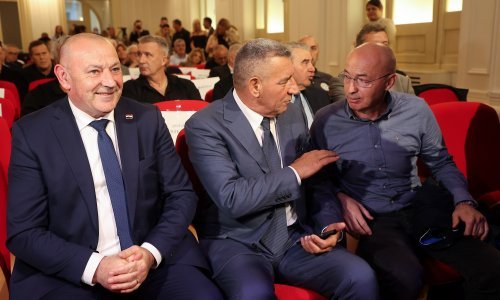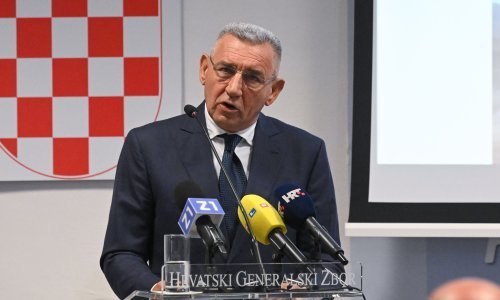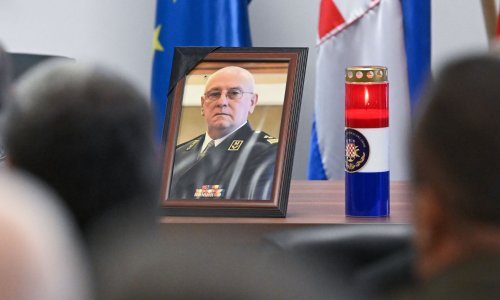In its closing statements in the "Gotovina, Cermak and Markac" case in August 2010, the Office of the Prosecutor of the International Criminal Tribunal for the former Yugoslavia (ICTY) asked that the three generals be found guilty and sentenced to 17-27 years' imprisonment, adding that the prosecution had proven that crimes committed against Serbs during and in the wake of Operation Storm were the result of intent of members of a joint criminal enterprise led by then President Franjo Tudjman, to eliminate the Serb population.
The Prosecution ask that Ante Gotovina be sentenced to 27, Mladen Markac to 23 and Ivan Cermak to 17 years in jail.
Evidence presented during the trial shows that beyond reasonable doubt Generals Gotovina, Cermak and Markac are legally responsible for crimes against Serb civilians, prosecutor Alan Tieger said in his closing statement.
Nobody here is claiming that Croatia had a plan or a policy to drive someone away. Those were members of the joint criminal enterprise, Tieger said, adding that no one was disputing that Croatian civilians had suffered in the war too.
He admitted however that on 4 August 1995 the Croatian army launched Operation Storm with a view to reclaiming territory under Serb control since 1991.
The intent to liberate is not contentious, but the intent by the political leaders to use that circumstance to eliminate the Serb population of the Krajina region is, said Tieger.
Towns and villages including Knin, Benkovac, Obrovac and Gracac found themselves under shellfire from 5 am. The people living there and international observers realised that the attacks were aimed at civilians and civilian targets... No place was safe, the prosecutor said. Tieger said the command was the result of a meeting between then Commander-in-Chief Tudjman and his associates, including then Defence Minister Gojko Susak, Gotovina and General Mladen Markac, a meeting which discussed the importance of driving civilians away.
The evidence showed that at a meeting on Brijuni island on 31 July 1995 a plan was devised that combined indiscriminate artillery attacks on the Serbs and methods of psychological pressure to ensure that they all left, the Prosecution said.
Tieger also said that the prosecution, which introduced the so-called presidential transcripts as evidence, had proven that the supreme commander was a person representing the idea that too many Serbs represented a danger and that the Croatian leadership introduced administrative and other measures preventing Serbs from coming back.
Former U.S. Ambassador to Croatia, Peter Galbraith, held the Croatian leadership responsible for serious and systematic crimes which, according to him, were committed with the tacit approval of President Franjo Tudjman and his associates, Tieger said.
The prosecution believes it has proven the existence of a joint criminal enterprise aimed at driving away the Serb population during and in the aftermath of Operation Storm, as well as the fact that the defendants were members of that joint criminal enterprise.
The evidence shows that the state leadership was aware of the consequences of failure to prevent and prosecute the crimes, Tieger said.
Prosecutor Katrina Gustafson said that it had been proven that General Gotovina had effective control over his forces and that he failed to take reasonable and adequate measures to ensure discipline, prevent crimes and punish the perpetrators.
Prosecutor Ryan Carrier said that the powers of General Ivan Cermak exceeded by far the powers formally exercised by the commander of the Knin Garrison and that they were the result of the fact that he was one of the people in whom the then Croatian President Franjo Tudjman had great confidence.
He used his position to enable the ethnic cleansing of Serbs by making sure that crimes were not prosecuted, and he made possible the change of the population structure by enabling the settling of Croats, Carrier said.
He went on to say that Cermak also obstructed activities by representatives of the international community and took part in covering up crimes.
The core of his responsibility is that he took no action regarding the crimes he had been informed of by representatives of the international community, the prosecutor said.
Prosecutor Prashanthi Mahindaratne, who spoke about the responsibility of General Mladen Markac, said that his participation in the joint criminal enterprise was evidenced by the Brijuni transcripts. Markac was personally on the ground at the time when the crimes were committed or immediately after their commission, and he took part in covering them up, the prosecutor said, adding that Markac had effective control over his forces but failed to punish them for the crimes committed.

































